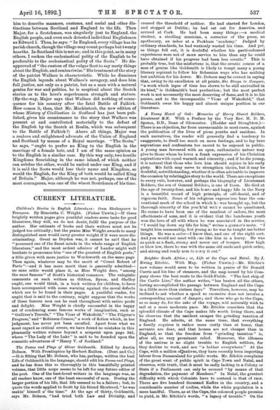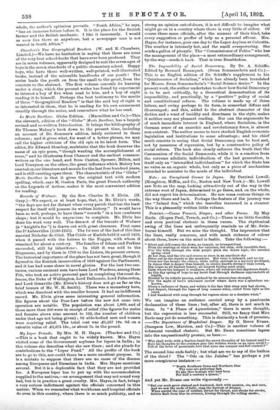Brighter South Africa ; or, Life at the Cape and
Natal. By J. Ewing Ritchie. With Map. (Fisher Ifnwin.)—Mr. Ritchie's new volume would seem to be written in praise of Sir Donald Currie and his line of steamers, and the map issued by his Com- pany shows the best route to the Gold-Fields. "The last ship of the Castle Line," the author writes, "has beaten all the others, having accomplished the passage between England and the Cape in a little more than sixteen days." Travellers, however, may be inclined to ask whether a speed so excessive does not involve a corresponding amount of danger; and those who go to the Cape, as so many do, for the sake of the voyage, will naturally wish to sail at a more moderate pace. Mr. Ritchie considers that the splendid climate of the Cape makes life worth living there, and he observes that the resident escapes the grinding taxation of England. He admits, at the same time, that everything a family requires is rather more costly than at home, that servants are dear, and that houses are not cheaper than in England, so that the freedom from "grinding taxation" is, after all, no very prominent relief. Moreover, the idleness of the natives is no slight trouble to English settlers, for they decline to work, and are "a bother everywhere." At the Cape, with a million of,}iatives, they have recently been importing labour from Damaraland for public works. Mr. Ritchie complains of the great want of public spirit in Cape Town and Natal, and observes, with truth, that it must be sadly lacking in a Colony or State if a Parliament can only be secured "by means of that degradation, the payment of Members." In Natal, the greatest difficulty with which Colonists have to contend is that of race. There are five hundred thousand Kaffi.rs in the country, and a considerable number of coolies, while the white population is a mere handful. There, as at the Cape, the coloured people promise to yield, in Mr. Ritchie's words, "a legacy of trouble." On the
whole, the author's optimism prevails. "South Africa," he says, "has an immense future before it. It is the place for the British farmer and the British mechanic. I like it immensely. I would as soon live there as anywhere, but a newspaper man is not wanted in South Africa."

































 Previous page
Previous page